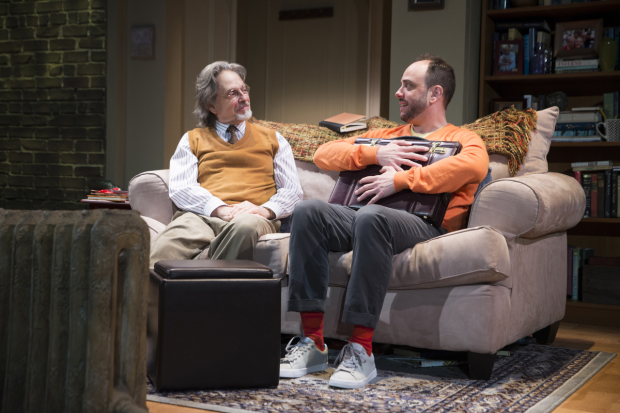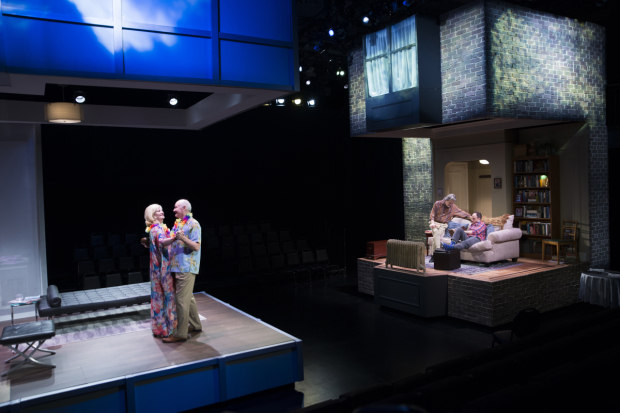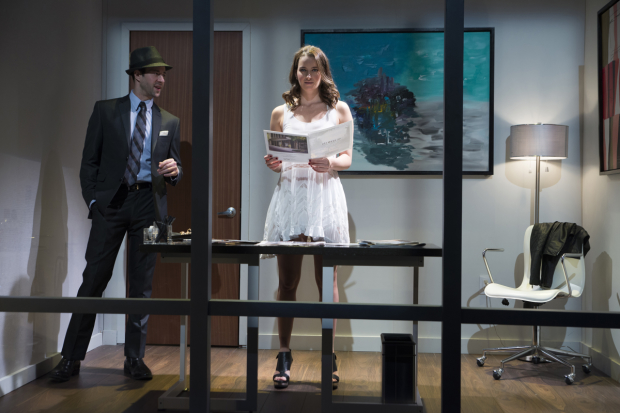A Better Place
Resentment and real estate take center stage in this world premiere from the Directors Company.

(© Jenny Anderson)
The residential buildings sprouting up all over Manhattan seem designed for exhibitionism. With walls made entirely of glass, these multistory display cases for the 1 percent implicitly say, "Look, but do not touch." Wendy Beckett builds her latest play, A Better Place, on this premise. In a year in which economic resentment seems to be at the center of every conflict, the resulting listless drama feels like a startling missed opportunity.
A world premiere from the Director's Company at the Duke on 42nd Street, A Better Place is the story of gay couple Les Covert (Rob Maitner) and Sel Trevoc (John Fitzgibbon), occupants of a cozy rent-controlled apartment on the Upper West Side. These palindromic homosexuals couldn't be more opposite in their approach to the luxury high-rise across the street: Les indulges in that favorite New York pastime, voyeurism. He is particularly obsessed with one family: John Roberts (Edward James Hyland), his wife, Mary (the hilarious Judith Hawking), and daughter Carol (Jessica DiGiovanni). They seem to have everything that waiter Les finds missing from his life: style, class, and a $4.2 million condo. Meanwhile, philosophy professor Sel thinks that his younger partner has bought too much into consumer culture. Despite his protests, Les spends hours staring across the divide between his life and theirs.

(© Jenny Anderson)
David L. Arsenault makes this chasm real with his confrontational scenic design: Staged in traverse, one end of the space features a platform for Les and Sel's lived-in, overstuffed apartment (books line the hall for lack of another home). The other end showcases the pristine black leather elegance of the Roberts abode (it could easily double as a therapist's office). Director Evan Bergman stages activity on both sides, even when the dialogue is focused squarely on one apartment. Often, Les sits on his rusty radiator and watches the scene on the other side, like a Netflix binger. Unfortunately, Beckett's cinematic script calls for even more locales that this set provides, leading to some awkward scenes in the no-man's-land between the two platforms.
It's not clear how these displaced scenes further the story in a way that could not be accomplished in the characters' respective homes. Beckett loads her story with bizarre plots twists that never seem to build to anything: Mary falls down, goes to the hospital, but is fine by the next scene. Tonally, the script careers between living room drama realism and snarky absurdism in a way that never really allows us to commit to the world of the play.
The character of Carol is the most glaring example of this: A grotesque millennial stereotype with a serious addiction to real estate porn, she lives off her parents' largesse as she entertains a parade of brokers who titillate her with their dirty talk, words like "palatial," "terrace," and "Tribeca." DiGiovanni does a fine job with this undercooked character (with an assist from the chameleonlike Michael Satow, playing every realtor in New York), but it is not enough to ever make us care about her.
Similarly, the well-cast Maitner and Fitzgibbon feel very authentic in their portrayal of an intergenerational gay couple from the Upper West Side, with Fitzgibbon especially exuding that Zabar's mystique. This is despite the script and direction sabotaging them at every turn: At one point, Les saunters into the living room wearing a fuzzy pink tiara and sipping a martini. Why? It's a throwaway sight gag that elicits few laughs.

(© Jenny Anderson)
The stakes of this "grass-is-greener" comedy-drama are also undermined by the fact that for the vast majority of New Yorkers, a rent-controlled one-bedroom on the Upper West Side is about as unobtainable as a luxury pied-à-terre in the sky. Everyone in this story is relatively privileged when it comes to real estate, a fact that could have served as a launching pad for a deeper exploration of the fallacies in our present conversation around inequality. Instead, Beckett settles for soap-operatic plot twists and a hastily constructed conclusion.
This is unfortunate because the themes underlying A Better Place are monumentally important. They deserve a better play.









